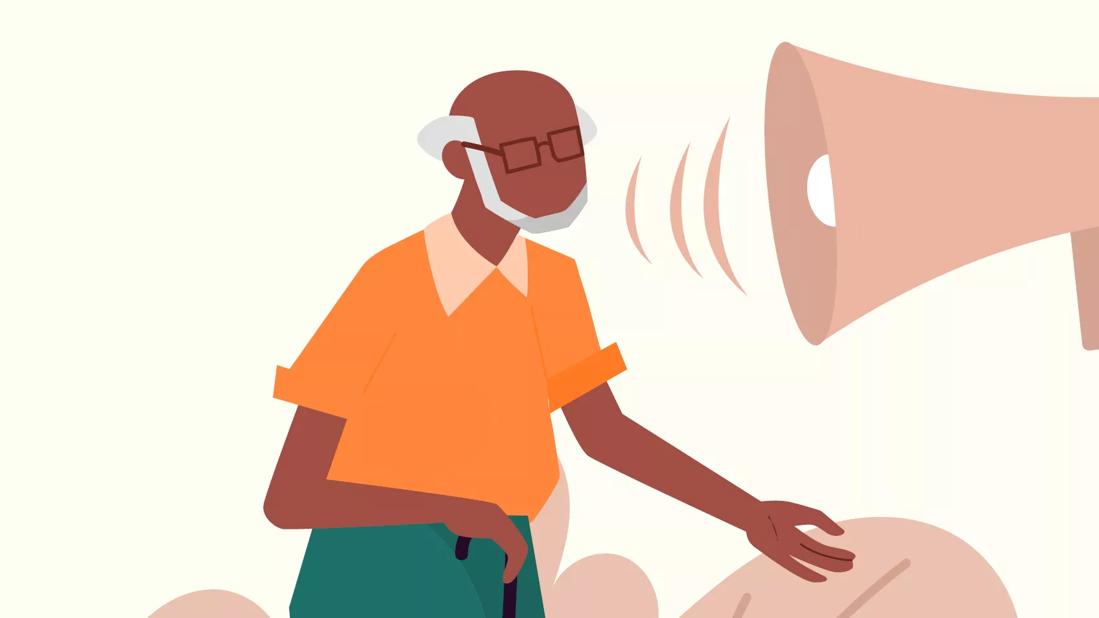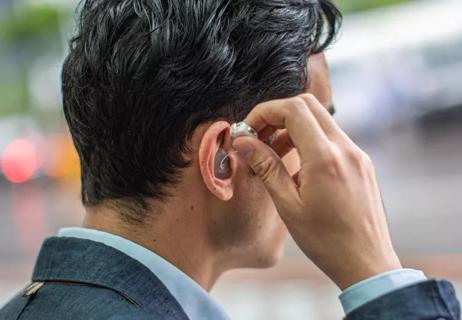Keeping your brain healthy is key

If you’ve experienced hearing loss, you may be missing out on more than conversations around you. Several studies suggest hearing loss can increase your risk for cognitive (mental) issues, including dementia.
Advertisement
Cleveland Clinic is a non-profit academic medical center. Advertising on our site helps support our mission. We do not endorse non-Cleveland Clinic products or services. Policy
Geriatric medicine specialist Ronan Factora, MD, helps us understand the connection that occurs between our auditory (hearing) system and the rest of our brain, while offering tips for increasing brain health.
Age-related hearing loss is the third most common chronic condition in older adults. And up to 8% of dementia cases are estimated to be from hearing loss in some fashion.
“The cause behind this link is unclear. But one theory is that hearing loss tends to cause some people to withdraw from conversations and participate less in activities,” says Dr. Factora. “As a result, you become less social and less engaged.”
A lack of stimulation results in a decline in growth, particularly in neural pathways needed to carry out a number of biological processes, memory function and more. This is why isolation (and even self-isolation) can be particularly hard on older adults. Because this lack of stimulation can increase your risk of developing dementia, social engagement is one of the activities promoted to protect brain health.
As you age, whether you have hearing loss or not, your cognitive abilities tend to have a natural decline. Fortunately, there are things you can do to reduce the severity of the decline and make small improvements along the way.
Advertisement
You can keep learning throughout your life — no matter how far you went in school. Studies show a lower risk of dementia if your level of education is high school or better.
“But studies also show that if you can maintain an 8th-grade level of reading or literacy throughout your life, it will help keep your mind stay active,” says Dr. Factora. “You can also engage in hobbies that help keep you learning or challenged.”
You may enjoy playing board games, ballroom dancing, playing a musical instrument or learning a foreign language. Any new activity that forces you to learn and increase your skill over time develops new neural connections in your brain.
“These healthy new neural connections may help you bypass any damage to the brain associated with dementia or Alzheimer’s disease,” Dr. Factora explains.
Social connections help keep your brain healthy as you age. So it’s important to maintain good relationships with friends and family.
“If you’re constantly engaged in a give-and-take conversation and are around a lot of people, that stimulation will have a positive effect on your brain health,” encourages Dr. Factora.
Exercise — particularly cardiovascular exercise — protects your brain as well, says Dr. Factora. He recommends getting at least 30 minutes of cardiovascular exercise (even walking at a brisk pace) at least five days each week.
“Other types of exercise, such as strength training, can be beneficial,” he says. “But evidence suggests that cardiovascular exercise probably is most helpful for maintaining brain health.”
Eating right is also good for brain health. Dr. Factora recommends following a Mediterranean diet. This focuses on eating lots of vegetables and fruits, along with legumes, fish, olive oil, and nuts and seeds.
“Not only is this type of diet good for your heart — it’s also beneficial for your brain,” he says.
There are studies that suggest hearing loss has an impact on brain function. It may result in a change in your brain structure, which directly increases your risk for cognitive impairment and dementia. But another possibility is that hearing loss can demand so much additional attention and effort to decode meaning in words and sounds that it takes up remaining brain capacity needed to process the actual meaning of messages.
More studies are needed to determine the direct cause hearing loss has on brain function and whether that decline is reversible, but hearing loss itself should be paid close attention to.
Some people ignore signs of hearing loss, or chalk them up to aging and just live with it. But hearing loss can affect your life in many ways. If you suspect you’re at risk, talk to your doctor and ask for an audiology evaluation to determine how severe your hearing loss is.
Advertisement
“If you do have hearing loss and your physician offers a solution like hearing aids, try them out,” advises Dr. Factora. “If you wait too long and develop memory problems, it will be more difficult for you to learn how to use these devices. It’s best to get used to them while the mind is still sharp so you can improve your quality of life.”
Advertisement
Learn more about our editorial process.
Advertisement

Sudden hearing loss can have many causes — but it’s important to seek treatment fast

Hearing aids can be enough for some people, but other devices — like for your phone, TV and fire alarm — can help, too

Untreated hearing loss can affect kids’ speech and language development and their overall quality of life

Reduce background noise, don’t talk too fast or too slow and above all, ask what’s most helpful to them

Ringing is already a sign of damage, but you can take steps to keep your hearing protected

Learn how to help encourage a better quality of life

Damage accumulates over time

Physical activity can help preserve and improve your cognitive function and fend off dementia, stroke and other health concerns

Wearing a scarf, adjusting your outdoor activities and following your asthma treatment plan can help limit breathing problems

Your diet in the weeks, days and hours ahead of your race can power you to the finish line

When someone guilt trips you, they’re using emotionally manipulative behavior to try to get you to act a certain way